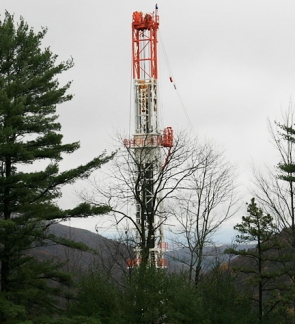Webinar to highlight best shale gas extraction conservation practices

Shale-gas development in Pennsylvania forestlands has raised concerns about whether it can be done with minimal impact to the environment.
UNIVERSITY PARK, Pa. — The best conservation practices for shale-gas extraction will be the focus of a free, Web-based seminar offered by Penn State Extension at 1 p.m. on Feb. 21.
The presentation, “Evaluating the Scientific Support of Conservation Best Management Practices for Shale Gas Extraction in the Appalachian Basin,” is part of a monthly series of one-hour webinars.
This month’s webinar focuses on research done by the Nature Conservancy. That organization’s shale-gas specialists, Scott Bearer and Tamara Gagnolet, will discuss their analysis of practices that could benefit the environment.
“Shale-gas development in Pennsylvania forestlands has raised a broad range of concerns about whether it can be done with minimal impact to the environment and still allow the forests to provide outdoor enjoyment for the public,” Bearer said.
“During the webinar, we will provide an overview of our assessment of various conservation practices related to shale-gas extraction. We also will discuss which best-management practices are most supported by the science and therefore should be considered when developing a conservation-minded shale gas lease.”
Presented by Penn State Extension’s Marcellus Education Team, most of the monthly webinars will be offered from 1 p.m. to 2 p.m. on Thursdays. Upcoming planned topics and presenters include:
— March 21: Stray Gas Migration — Fred Baldassare, senior geoscientist with Echelon Applied Geoscience Consulting.
— April 24: Utica Reservoirs — Mike Arthur, Penn State professor of geosciences and co-chair of the Penn State Marcellus Center for Outreach and Research.
–May 16: Shale Energy Development’s Effect on the Posting, Bonding and Maintenance of Roads in Rural Pennsylvania — Mark Gaines, Pennsylvania Department of Transportation Bureau of Maintenance, Operations and Roadway Management, and Tim Ziegler, Penn State Larson Transportation Institute, Center for Dirt and Gravel Road Studies.
–June 20: Royalty Calculations for Natural Gas from Shale — Jim Ladlee, associate director, Penn State Marcellus Center for Outreach and Research.
Previous webinars, publications and information also are available on the Penn State Extension natural-gas website (http://extension.psu.edu/naturalgas), covering a variety of topics, such as Act 13; seismic testing; air pollution from gas development; water use and quality; zoning; gas-leasing considerations for landowners; gas pipelines and right-of-way issues; legal issues surrounding gas development; and the impact of Marcellus gas development on forestland.
Registration for this webinar is not necessary, and all are welcome to participate by logging in to https://meeting.psu.edu/pscems . For more information, contact Carol Loveland at 570-320-4429 or by email at cal24@psu.edu.
